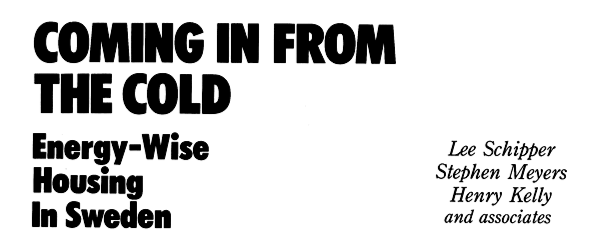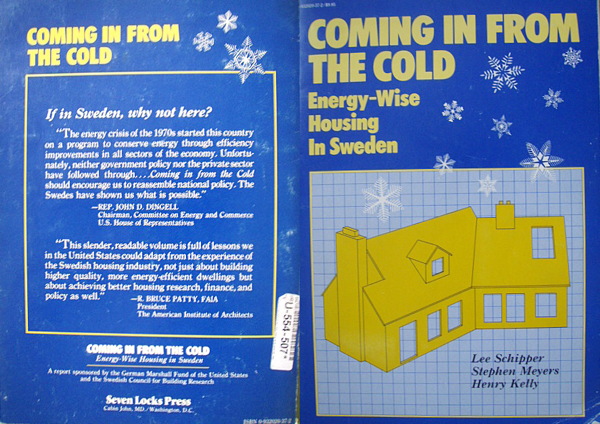Coming In From the Cold - the story behind the story or How the nations top scientists gave up on US home builders
As much as my Swedish housing industry research colleague Scott Hedges and I would like to think we discovered the success of MMC in Sweden, we have to credit work which has encouraged our thinking and research. The methods we are examining were described years ago by much greater minds than ours.

During the 1980's scientists working at the Lawrence Berkley Energy lab noticed that less energy was being used to heat homes in Sweden than in other industrial countries. Was the data wrong? No, Sweden was outperforming other countries. A man named Henry Kelly, who was director of a group called American Council for an Energy Efficient Economy, along with a Berkley scientist Lee Schipper, and colleague Stephen Myers, realized that the Swedes weren’t just building a few energy efficient houses. Rather they had managed to make the average house, the kind built every day much more energy efficient. The Swedes had changed housing though a comprehensive effort encompassing the building products industry, the construction industry, national building codes, national lending practices, and trades unions.
The USA had just passed through a severe energy crisis that rocked the entire economy. Our band of researchers saw what this could mean to energy policy in the USA. Determined to quantify the progress in Sweden, they secured a grant from the German Marshall Fund and cooperation from the Swedish Council for Building Research to do something that is rarely (if ever) undertaken by the building industry: an international collaborative study to find out what actually went on in Sweden and how it might inform the way we build and structure our housing industry here in the US. Their report was done in 1985 and the results distilled into a small book called Coming In From the Cold: Energy-Wise Housing In Sweden.
This book is the story of what they discovered. It documented the progress and results of the change to housing in Sweden and how the various factors in research, building, manufacturing, lending, codes, and oversight all contributed to the change. The book is a gospel for learning from the Swedish Housing industry. Its all in there, and it was communicated to congress and the National Homebuilders Association and anyone who would listen. Anybody with half a mind and this short booklet at their side could reshape the industry in a heart beat. A few thin pages could show the way forward to improve the quality of our construction, reduce energy use nationwide, and extend the benefit to anybody who wished to buy a home. They truly stood at the precipice of a new American housing industry.
 Then like wisdom cast into the void, builders did not read the book and the housing industry who Schipper and Kelly were trying to help snubbed them.
Then like wisdom cast into the void, builders did not read the book and the housing industry who Schipper and Kelly were trying to help snubbed them.
Today, Lee Schipper is an internationally recognized expert on energy in transportation, and a co-recipient for a Nobel prize in climate change. His experience trying to convince American homebuilders to see the benefits of MMC and OSM left him feeling that they were hopeless to change. Schipper is still skeptical of the capacity for change in the homebuilding industry, saying recently "Swedes build good shelter, we build Tax Shelter".
 Henry Kelly, went on to be the president of the Federation of American Scientists. Though Kelly has been honored for "promoting the use of physics for the benefit of society", he too hasn't been able to convince American homebuilders that stopping energy loss in houses requires changing the way we build. Kelly has returned to work again directly on the issues of energy efficient building, appointed by the Obama administration to be the Deputy Assistant Secretary for the Office of Energy Efficiency and Renewable Energy at the U.S. Department of Energy.
Henry Kelly, went on to be the president of the Federation of American Scientists. Though Kelly has been honored for "promoting the use of physics for the benefit of society", he too hasn't been able to convince American homebuilders that stopping energy loss in houses requires changing the way we build. Kelly has returned to work again directly on the issues of energy efficient building, appointed by the Obama administration to be the Deputy Assistant Secretary for the Office of Energy Efficiency and Renewable Energy at the U.S. Department of Energy.
The impressive careers of these two men, who have been honored for their work in every field except the building industry who ignored them, only highlights the tragedy that their work on Swedish housing does not grace their credentials today. Their revolution in American housing is glaring in its absence. The very people who stood to gain from these insights turned their back. The scientists went on to earn respect in other fields where science is valued. Meanwhile the NAHB gave the world the McMansion and went on to make a living lobbying against the kinds of policy innovation that led to Sweden’s success. And we know all too vividly exactly where that ended up taking us.
So here we are, 30 years later, and while I would be the first one to point out that the homebuilding industry in the US is largely the same as when Schipper and Kelly wrote Coming In From the Cold, the fact is that there are now greater pressures to change than there have ever been. The Passive House movement has clearly taken hold in the US. Energy performance is becoming a priority, and work weatherizing older buildings is seen as a way to both put people to work and help the nation's energy policy. Despite our progress in energy codes nothing points a clearer way forward than their book's recommendations. Residential lending in the USA, now clearly in a shambles, would also benefit from the lessons they've spelled out. Their book shows the way lending can be used to facilitate change in the industry, a tool for better housing rather than an out of control financial medium. And now as the housing industry is saddled with unsold and cheaply built oversized homes, its clear that a new kind of home, energy efficient, rapidly built, and smartly financed could put this housing industry back on its feet. Clearly there is demand for this new kind of home that the industry never got around to building. The kind of home that so long ago Kelly and Schipper showed them how to make. The emergence today of skilled and innovative builders like Bensonwood is validation of their prescient work done 30 years ago in Stockholm.





Buy the used ones quickly. The book only costs $7.95
ReplyDeleteLee Schipper has died, sadly he'll never see the day we finally learn our lesson from Sweden:
ReplyDeleteNYT obit